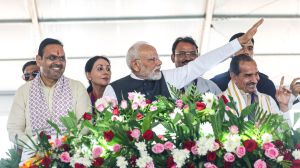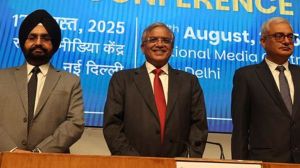In Israel, Putin tries to allay its Iran, Syria fears
President Vladimir Putin, on the first-ever visit by a Kremlin leader to Israel, today sought to allay the Jewish state’s fears on Rus...

President Vladimir Putin, on the first-ever visit by a Kremlin leader to Israel, today sought to allay the Jewish state’s fears on Russia’s proposed missile sales to Syria and its nuclear ties with Iran.
Stressing that nuclear cooperation between Russia and Iran was limited only to civilian activities, Putin said he opposed any effort by Tehran to build an atomic bomb. ‘‘We are working with Iran in order to develop the atom for peaceful ends and we are against any programme seeking to endow Iran with an atomic weapon.”
Hardening his line towards Iran’s nuclear programme Putin also said at a press conference in Jerusalem that Tehran needed to do more to assure the world it was not trying to build atomic weapons.
On the eve of his visit, Putin proposed hosting a West Asia peace conference in Moscow later this year. The offer was rejected as premature by Israel and the US. Israeli Vice Prime Minister Ehud Olmert said on TV that Putin did not raise the proposal in talks with Prime Minister Ariel Sharon. Russian Foreign Minister Sergie Lavrov said on Thursday that Putin had been misunderstood.
Putin’s proposal appeared to be part of his wider plan to revive Moscow’s Cold War influence in West Asia —— a status Russia lost after the Soviet Union’s collapse.
Putin also took fire from Israeli President Moshe Katsav over the Russian missile deal with Syria. ‘‘Israel is still forced to fight terrorism and the Russian missiles could limit our ability to (do so),’’ Katsav told a joint news conference, referring to Israel’s fears the weapons could wind up in the hands of Lebanese militants.
Nonetheless, Katsav called Putin a friend of Israel and both leaders stressed the need to speed up a joint effort to fight terrorism and anti-Semitism in Russia and elsewhere.
Putin said the Strelet missiles involved in the deal were vehicle-mounted, short-range and could not be turned into shoulder-launched missiles. He said Russian inspectors would be able to carry out spot examinations of the systems.




- 01
- 02
- 03
- 04
- 05



























